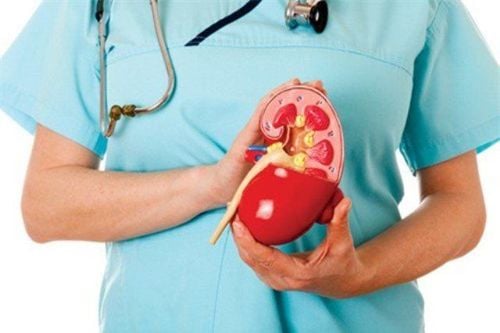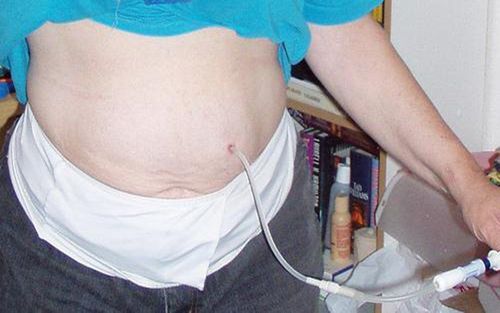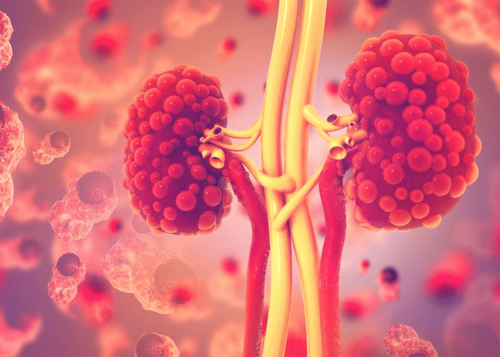This is an automatically translated article.
Chronic glomerulonephritis is a very dangerous disease if not diagnosed and treated promptly. Patients with chronic glomerulonephritis often show signs of decreased body resistance, leading to the appearance of infectious complications such as respiratory infections, urinary infections.1. What factors increase the risk of chronic glomerulonephritis?
The following factors may increase the risk of chronic glomerulonephritis including:When the patient has a syndrome called Alport Or from acute glomerulonephritis progressing to chronic if untreated timely; The specific vasculitis here is abnormal arteritis; The patient has a habit of smoking for a long time; Working and being exposed to environments containing hydrocarbon solvents such as paints, fuels (petroleum, petroleum products), vehicle exhaust, glues and adhesives, organic solvents, certain aerosols and pesticides, which may increase the risk. Have a history of cancer: cancer can affect the function of many organs in the body including the kidneys; Have autoimmune disorders such as Goodpasture syndrome and lupus erythematosus; Uncontrolled and persistent diabetes mellitus; Having a bacterial or viral infection can increase your risk of developing chronic glomerulonephritis.

Đái tháo đường không kiểm soát được và kéo dài là yếu tố nguy cơ của viêm cầu thận
2. Complications of chronic glomerulonephritis
Chronic glomerulonephritis, once not treated in time, can cause dangerous complications for patientsPatients with chronic glomerulonephritis often show signs of decreased body resistance leading to complications of infections such as respiratory infections, urinary tract infections.
Once the patient is infected, the chronic glomerulonephritis will worsen and form an acute episode of glomerulonephritis on the background of chronic glomerulonephritis with signs of more edema, more hypertension, bloody urine.
The disease can progress for many years and then progress to end-stage renal failure.
3. How long to live with end stage chronic kidney disease?
Normally, chronic kidney disease will progress in 5 stages. In stage 1 and stage 2, if the disease is detected early and has the right treatment plan combined with a reasonable diet, the Living with the disease as well as completely treating the unpleasant symptoms of the disease is completely possible. In this stage to control well, patients need:Control blood pressure well, reduce the amount of protein in the water. urine, light work. Avoid infection such as keeping clean, wearing a mask when going out, keeping warm when it's cold... Avoid using drugs that are toxic to the kidneys such as aminoglycosides antibiotics as well as non-corticoid anti-inflammatory drugs. However, when chronic kidney disease has progressed to the end stage or stage 5, at this time the kidney function has completely declined, the patient needs to take alternative treatment measures to be able to maintain the condition. There are currently 3 methods of treating end-stage chronic kidney failure:
Hemodialysis Peritoneal dialysis Renal transplantation In which, hemodialysis (dialysis) and kidney transplantation are the two commonly applied methods. most variable.

Chạy thận nhân tạo (lọc máu) và ghép thận là 2 phương pháp được áp dụng phổ biến nhất
For kidney transplantation, depending on whether the donor's kidney is the kidney of a living person or a brain dead person, has the same bloodline or not, but the survival rate is different. If the kidney is thought to be from a blood relative of the patient, the 5-year survival rate is 95-98%, the 10-year survival rate is 75-85% and the 20-year survival rate is 50% depending on the case. This means that on average, blood transfusion patients can live 15 to 20 years with good treatment and compliance. However, there are still many cases after detecting end-stage chronic renal failure and conducting treatment, patients can die after only 1-2 months of detection.
In order to prolong the life of patients with chronic kidney failure, help the treatment be effective and reduce the number of dialysis sessions, the patient should pay attention to the correct adherence to the doctor's treatment regimen, the necessary diet. strict abstinence, keep the spirit comfortable, do gentle sports...
Please dial HOTLINE for more information or register for an appointment HERE. Download MyVinmec app to make appointments faster and to manage your bookings easily.













